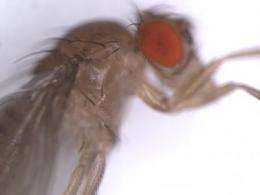Researchers announce Huntington's disease breakthrough

(Medical Xpress) -- Medical researchers may have uncovered a novel approach to treat an incurable and ultimately fatal neurodegenerative disease that affects hundreds of thousands of people.
Two international studies, one led by the University of Leicester, and the other a collaboration with Leicester led by scientists in the USA, hold out promise for slowing down the development of Huntington’s disease – and potentially, Alzheimer’s and Parkinson’s diseases. The research, which is in its early stages, represents an important milestone in understanding these debilitating conditions.
Huntington’s disease is a devastating inherited neurodegenerative disorder that is always fatal. The disorder of the central nervous system causes progressive degeneration of cells in the brain, slowly impairing a person's ability to walk, think, talk and reason. Approximately 1 in 10,000 individuals are affected worldwide.
In the world-famous Department of Genetics at Leicester, the groups of Dr Flaviano Giorgini and Prof Charalambos Kyriacou found that by genetically targeting a particular enzyme in fruit-flies, kynurenine 3-monooxygenase or KMO, they arrested the development of the neurodegeneration associated with Huntington’s disease. Furthermore by directly manipulating metabolites in the KMO cellular pathway with drugs, they could manipulate the symptoms that the flies displayed.
The fruit-fly study, to be published in Current Biology on 7 June, was also aided by the groups of Prof Robert Schwarcz (Maryland Psychiatric Research Center, University of Maryland School of Medicine, Baltimore), who pioneered work in this area, and Dr Paul Muchowski (Gladstone Institutes, University of California, San Francisco). The two latter workers and Dr Giorgini have simultaneously published a paper in Cell, announcing a similar breakthrough in understanding the therapeutic relevance of KMO in transgenic mouse models of Huntington’s and Alzheimer’s diseases.
The fruit -fly research at Leicester took place over three years and was funded by the Huntington’s Disease Association and the CHDI Foundation, Inc. Dr Giorgini, who led the UK study, states, “This work provides the first genetic and pharmacological evidence that inhibition of a particular enzyme - KMO - is protective in an animal model of this disease, and we have also found that targeting other points in this cellular pathway can improve Huntington’s disease symptoms in fruit flies. This breakthrough is important as no drugs currently exist that halt progression or delay onset of Huntington’s disease. We are tremendously excited about these studies, as we hope that they will have direct ramifications for Huntington’s disease patients. Our work combined with the study in our companion publication in Cell, provides important confirmation of KMO inhibition as a potential therapeutic strategy for these individuals. As many KMO inhibitors are available, and more are being developed, it is hoped that such compounds can ultimately be tested in clinical trials for this as well as other neurodegenerative disorders.“
In Leicester the experiments were carried out by Drs Susanna Campesan, Edward Green, and Carlo Breda and in Baltimore, by Dr Korrapati Sathyasaikumar. The collaborating teams will continue their studies aimed at enhancing the development of medical intervention in Huntington’s and other neurodegenerative disorders.
Cath Stanley, Chief Executive of the Huntington’s Disease Association, said: “This is an exciting piece of research that will offer hope to the many people affected by Huntington's disease."











.jpg)






